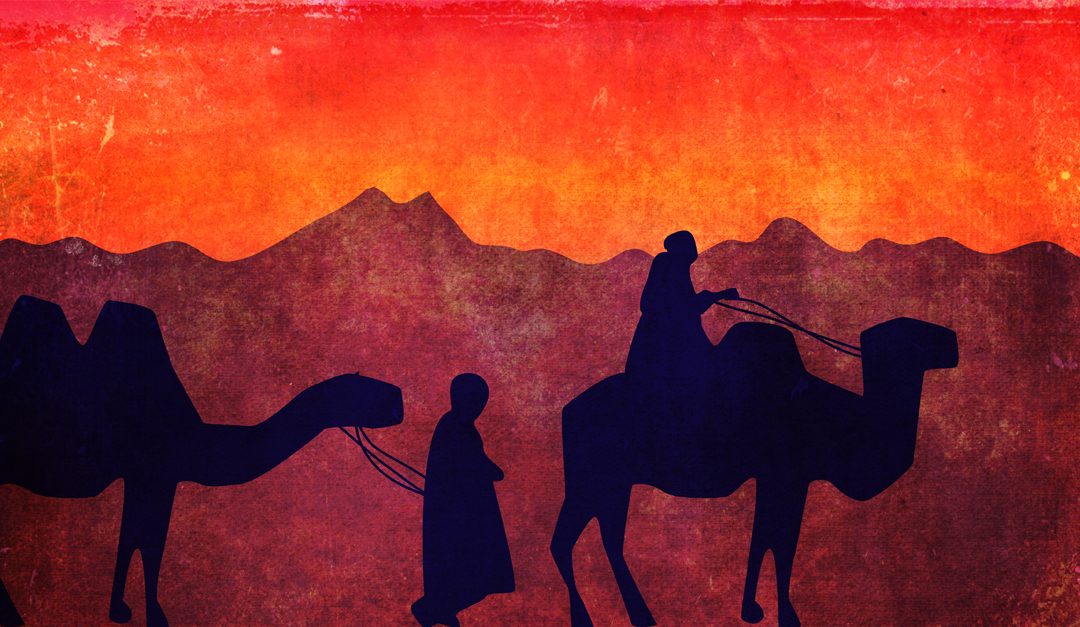Go to Egypt
At the beginning of the story, Abram’s fate is still unclear to us. He is commanded to go to the land which Yahuwah will show him. Following his arrival in the land of Canaan, a famine strikes the region. It is difficult to understand why such a fatality falls on the poor man upon his arrival (although we do not really know the time that has elapsed between his arrival and the beginning of the famine). For the moment, Abram still seems perfectly submissive to the Almighty and misfortune catches him anyway. That was not the punishment or the consequence of a fault, but it was in the will of Yahuwah that Abram, just like all of us, got to know Egypt. There, he introduces his wife as his sister, and Yahuwah strikes the land with wounds. It was Abram who has slightly distorted reality and despite of that, it was the “innocent” Egyptians who are punished.
Moreover, Abram is blessed by all kinds of gifts in exchange for his wife that he can later keep even when the lie had been unmasked. These gifts from Pharaoh are part of the famous fortune of Abram. The basic capital of the people of Israel comes largely from this treasure offered by Egypt in exchange for Sarai. (This public treasure comes in part from the goods with which Abram left his people and will eventually be supplemented by the gift of Abimelech). Yahuwah then shows Abram what will be the destiny of his descendants. The people will have to follow a similar path to his: after a famine, they will go to Egypt to be slaves for four centuries before finally leaving with a very large fortune that will also be handed down to them by the Egyptians. (This fortune is simply the one the people lost by becoming slaves together with the wages of their hard labour.)
At the beginning of our journey of believer, we also make mistakes and stumble when we are put to the test succesively. However, we must not always suffer the negative consequences of our mistakes. On the contrary, we often come out even more blessed than before, just as Sarai enjoyed divine protection from Pharaoh’s misdeeds, and Abram was able to keep the good he had received in exchange for his “sister”.
This is a very comfortable situation.
We make mistakes and are not even getting any telling off, on the contrary, we get cuddles from the Father like little children. Many of us would like to preserve this state of spiritual infantilism. It is indeed very good to live on Yahuwah’s lap like a little kid, but when the time of adulthood comes and we want to remain children, that is not going not work. For the Almighty has not called us to remain eternal infants, but wishes to make us responsible adults. The only thing that must survive from our childhood is the purity of our heart and nothing else. This heart through which we must judge and understand our neighbor in love and total disinterest.
This is perhaps one of the main reasons why many are just stopping after a while without being able to make any further step forward in spirit. We reject all responsibility, like young persons who refuse to grow up and remain eternal rebellious teenagers. When we still thing to be children, we lie mainly to ourselves. In short, we make ourselves spiritually helpless and useless.
Unfortunately, we are not the only ones responsible for this unhealthy state. Those who teach us and act as our spiritual fathers are also stuck in the false idea that they will teach us for the rest of our lives, we are simply to sit in the pews of church and listen to and follow the same pastor Sunday after Sunday, year after year. This Catholic root continues to wreak spiritual havoc, even in the most reformed churches.
But there is another big trap we often fall into. We are harshly rejecting anything coming from Egypt, everything that was part of our previous life. We close the door in front of our past drastically and flee in our religious cocoon as in a monastery from which we categorically refuse to go out to go to the world. Yet it is in this world that our place is according to the will of the Messiah expressed in the Higy Priestly Prayer. It is in this world that we must carry out our ministry. We can not be under the world’s yoke in spirit, but physically, this world does indeed need our presence.
It is also from this world that all our fortune, our material goods and our knowledge
in various fields that allow us to fulfill our ministry and to bring the Good News to the Egyptians. It would be deeply unwise to reject all this. Neither should we reject all aspects of human sciences which, at first glance, may seem to contradict the Word of Yahuwah, but we can easily realize that many times, they actualy prove it. (I am naturally talking here about sciences based on observation and experimentation, such as physics, chemistry or biology – and not on assumptions like most of the so called “natural“ sciences).
Yeshua also came out of Egypt
There is still a third example of an egyptian exile in the Bible. It is the exile of our Lord during his childhood, when he was forced to flee the persecution of Herod. Yeshua spent much of his youth in Egypt fulfilling the prophecy contained in this week’s haftara.
The light of the nations had to make acquaintance with these peoples, the Gentiles
for whom he came down into this world so that the knowledge of Yahuwah and the Redemption should also be offered to them. By that, he showed us the example to follow. It was not necessary for him to know anyone, because he knows everyone originally. Nevertheless, as a man of flesh, he had to show us the way we must go through ourselves.
Next parasha: VAYERA
VIDEO VERSION

